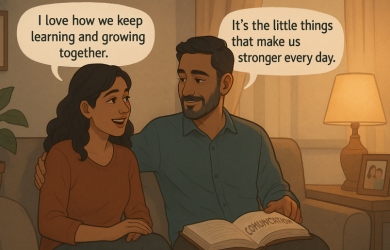Practical Tools to Grow your Love Bank

Unlock Daily 30-Sec Tips for a Happier Relationship
👉 Subscribe FREEKey Takeaways
Marriage.com AI Quick Summary
What do relationships and financial planning have in common? Both need constant monitoring, attention and consistency. You don’t just open a bank account and then lay back, relax and say, “well, I’ve done it…that’s it”. We all know that opening a bank account is only the beginning of a long and continuous process of monitoring your spending and making consistent deposits to grow your balance.
However, often times in relationships, partners work so hard to be charming, compassionate and attentive in the honeymoon phase, and once they say, “I do”, they sit back and say, “I’ve done it…the end”! It is no wonder that once all the goodwill from the honeymoon phase evaporates, friction and conflict begins to surface, and the foundation of the relationship starts to crumble.
Now, let’s continue with the analogy of a financial portfolio. Whenever you make consistent deposits in your account, your security and confidence in your financial future increases. When you later have to make some withdrawals, it doesn’t seem to be much of a strain, since you still have a healthy bank balance. However, let’s say that you don’t have enough money in the bank, and haven’t made many deposits lately. Then, when you have to pay some big bills, it causes tremendous anxiety and worries about the future.
Similarly, when couples focus on the growth of their relationship and make a consistent effort to build their relationship portfolio with sustained enthusiasm, they are depositing into the “love bank”. Even when they have conflicts or arguments (which is inevitable in any relationship), they bounce back quickly since they are confident in their love and trust for one another. However, when there aren’t many deposits being made towards relationship building, then every small withdrawal (arguments) erodes their sense of safety and trust in the relationship.
So, how can couples work towards growing their relationship portfolio?
Here are 3 practical strategies that couples can plan to do consistently to maintain positivity in their relationship –
1. Rituals of connection
Every cultural tradition and every family has its own rituals. These rituals serve to create a sense of unity, togetherness and bonding between family members, tribes and cultures. For instance, a family that sits together to eat dinner and discuss the happenings of the day, is making a deliberate attempt at connecting and checking in with each person at the end of a busy day.
Similarly, it is important for couples to create rituals of connection, which is an anchor for the relationship. Examples of rituals that couples can initiate in their homes can be: going for a walk every evening after work or cooking and eating dinner together. No matter what happens in the course of the day, having these healthy rituals helps couples to tune in to each others’ lives, moods, and have better awareness, empathy and understanding.
Rituals of connection need to be
- Consistent,
- Uninterrupted -giving your partner full attention
- Achievable – something that can be incorporated realistically into your everyday life
2. Daily appreciation
If you want to become a relationship millionaire, then I can’t stress enough the importance of cultivating a daily appreciation habit. Research has shown that our brains tend to have a negativity bias. This served us a purpose as cave men and women since being attuned to danger signals meant we would survive! However, when we tend to focus too much on the negatives in our partner and tend to overlook and ignore the positives, it begins to weaken the emotional stability of the relationship.
By making appreciation a conscious habit, you are rewiring your brain from the anxious, flight-fight mode to calm, safe, positive mode. At the end of each day, make it a point to highlight and appreciate 3 things about your partner’s thoughtful actions, words and qualities. Another benefit of the appreciation habit is that you are now training your mind to focus on identifying 3 positive, loving qualities, rather than constantly collecting data on the negative. This is a great way to increase deposits in your love bank!
3. Listen attentively
Mindful and attentive listening is fast becoming a lost art! The advent of electronic devices has created more opportunities for us to be divided in our attention to tasks, people and relationships. However, technology is not the only culprit. When you feel anxious or blamed by your partner, often there’s a tendency to block out what he/she is saying and to have your own unique narrative playing inside your head!
This might take the form of:
- Mind reading (“I know she must be thinking, he forgot to wash the dishes again!”)
- Jumping to conclusions (“he didn’t want to go out to dinner with me last night, so he mustn’t love me”)
- Filtering (holding on selectively to the one negative comment that your partner might have said amongst multiple positive comments)
All these cognitive distortions arise from an anxious mind, and it creates a wall between couples when trying to communicate.
Make a conscious effort to pay full attention to your partner when he/she is talking. Make steady eye contact, use appropriate body language to express your focus and attention, and make a concerted effort to understand your partner’s point of view, without jumping to provide quick solutions. After your partner has finished speaking, reflect and mirror what you heard and ask for clarifications so that you can fully absorb the essence of the message.
Practice these simple, yet effective tools on a daily basis and your relationship will grow in happiness, health, and fulfillment!
 Tips
Tips
Write your tip or submit a video tip
All tips are reviewed before the publishing.
Share this article on
Want to have a happier, healthier marriage?
If you feel disconnected or frustrated about the state of your marriage but want to avoid separation and/or divorce, the marriage.com course meant for married couples is an excellent resource to help you overcome the most challenging aspects of being married.
Related Articles
Recent Articles
Related Quizzes
Unlock Daily 30-Sec Tips for a Happier, Healthier Relationship
👉 Subscribe FREE on YouTube We'd love your feedback!
We'd love your feedback!
 Expert Q&A
Expert Q&A
Ask your question related to this topic & get the support you deserve from experts.


















 Thanks for your feedback!
Thanks for your feedback!